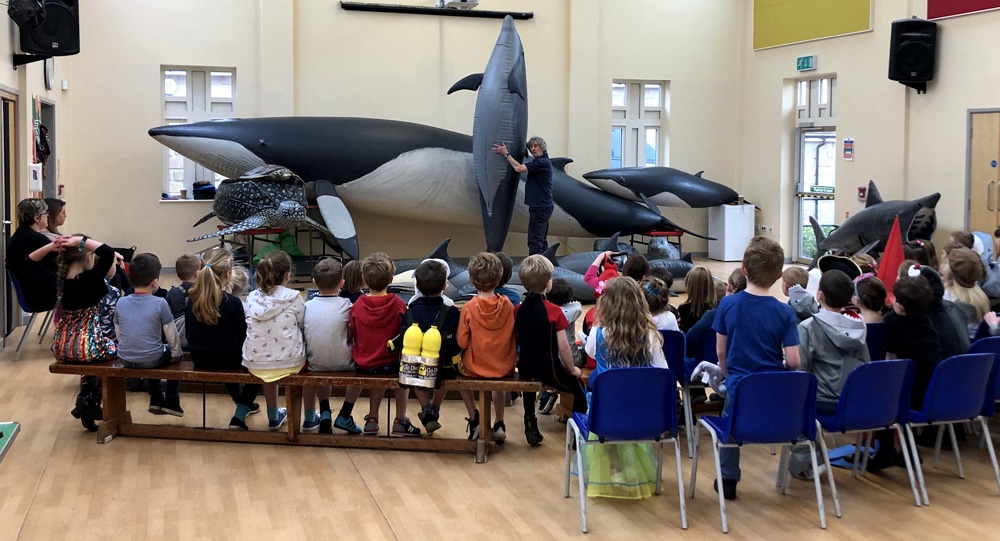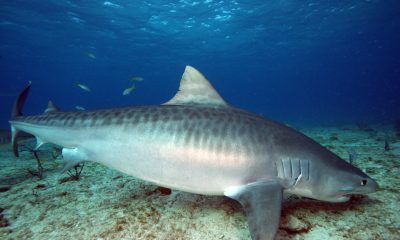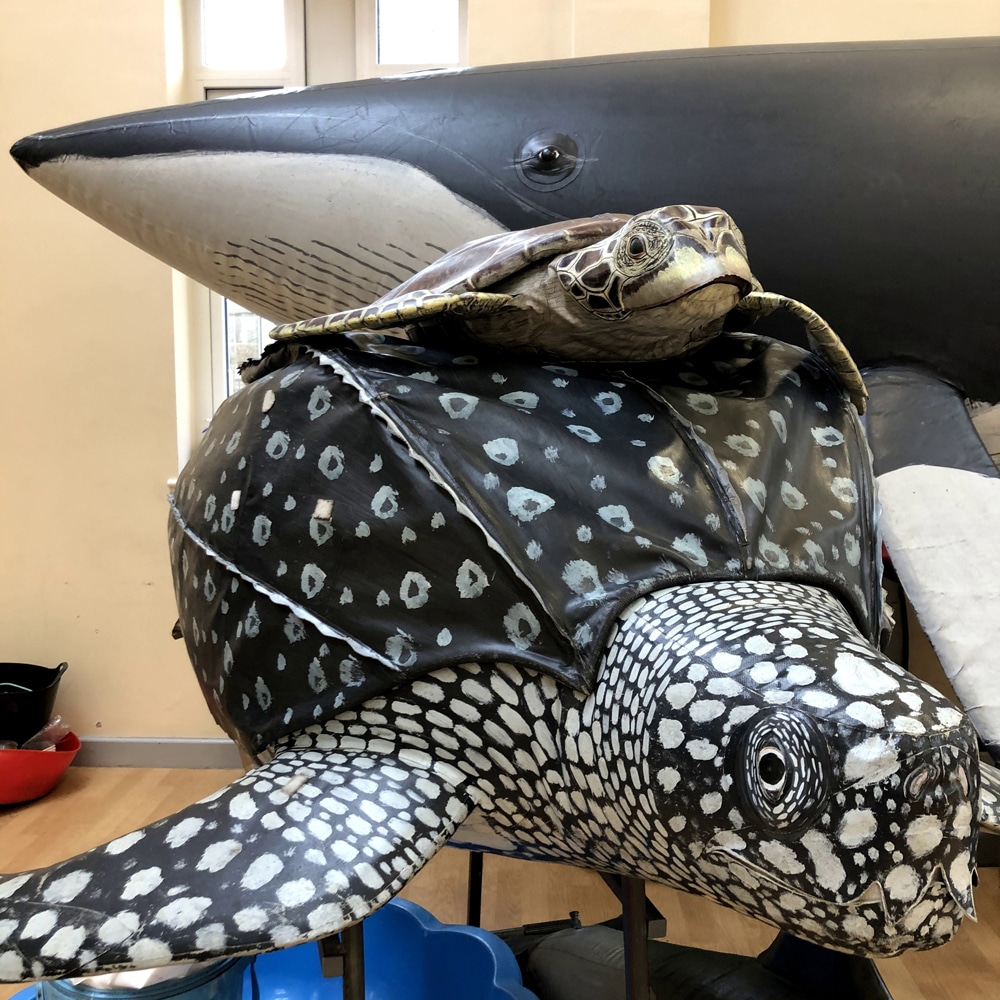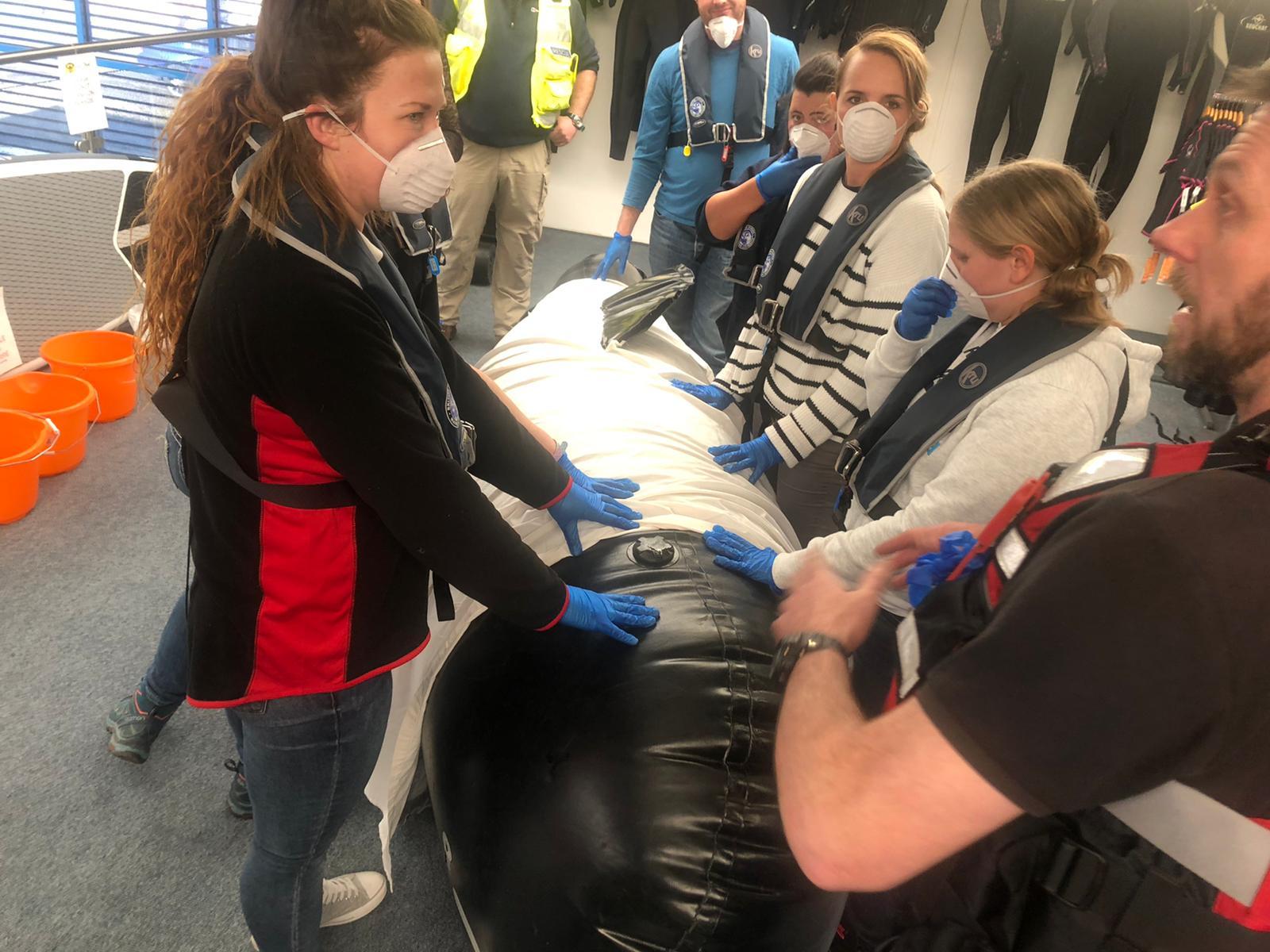Marine Life & Conservation
Go Dive raise awareness in Marine Conservation

Go Dive Scuba Store in Derby have raised awareness of marine conservation issues with nearly 500 school children and over 100 members of the public thanks to a grant from Sea-Changers. The grant was given to raise awareness of marine conservation issues and to inspire the next generation of divers, policy makers and public to make a difference.
Derbyshire can lay claim to being the county with the place furthest from coastal waters anywhere in the United Kingdom. This can mean limited opportunities for the public, and especially school children, to experience, appreciate and enjoy the wonders of the sea. The team at Go Dive recognise that at a time when our oceans are in trouble from over fishing, pollution, lack of protection and climate change there is a unique opportunity to harness our love for the sea and inspire the people of land locked Derbyshire to act to make a change.
James Parsons, owner and shop manager, said: “The funding from Sea-Changers has given us a fantastic opportunity to bring our love of the sea to the public in Derbyshire”.
The funding from Sea-Changers allowed Go Dive to work with two local schools, Bemrose Primary and Holbrook Church of England Primary, to provide school workshops through the Marine Wildlife Roadshow and to hold a public open day. The school workshops addressed issues including plastic pollution and recycling and children even had the opportunity to meet an 8m long Minke whale.
Jason Pass, Head of Primary at Bemrose, said: “The children, from the youngest in Reception to the oldest in Year 6, all really enjoyed the workshops. They learned lots about the effects of pollution and about marine animals. They really enjoyed the fun activities and especially liked the Whale Workshop’s amazing inflatable creatures.”
The workshops at Holbrook Church of England Primary coincided with World Book Day and to mark this the school chose to focus on the book Storm Whale by Benji Davis and rename the day World Whale Book Day. All children came dressed up in sea-themed costumes and it was fantastic to see jelly fish, sharks and even mini divers in the audience.
The public open day on Saturday 7th March was very well attended and featured life size marine mammal models, activities that looked at marine plastic issues, art activities led by Roz Hamer Art and a stand showcasing the PADI Project AWARE flagship citizen-science program, Dive Against Debris. The programme empowers scuba divers to remove marine debris from the ocean and report data on the types, quantities and locations of material collected.
The British Divers Marine Life Rescue (BDMLR) Midlands branch had a stand with their team on hand to raise awareness of their work. The Midlands branch provide an important network that are able to connect different areas of the country to enable wildlife transfer and mobilise quickly to provide additional support to all coastal areas. In addition, Sally Evans from MSDS Marine was on hand to provide her knowledge of marine mammal bones found on archaeological sites to the public with training in how to identify bones found on the beach.
On Sunday 8th March Go Dive were delighted to let BDMLR use their training facilities free of charge and hosted the first ever Midlands based marine medic training course.
Hazel Waddingham-Lewis, Area Coordinator for the Midlands, said:
“British Divers Marine Life Rescue – Midlands would like to thank Go Dive for their incredible support and free use of facilities over the weekend. This has enabled us to showcase some of the work carried out by over 3,500 volunteer Marine Mammal Medics throughout the UK, including the Midlands volunteer medics who relay rescued seal pups to rehabilitation centres in Cheshire, Norfolk and Lincolnshire for vital treatment. The Marine Mammal Medic course held on Sunday saw another 23 medics qualify from all over the UK, including Scotland, Wales and South West England. As a registered charity we rely solely on donations, therefore none of this would have been possible without the support from Go Dive, their staff, the new volunteer medics and the volunteer instructors from the Midlands and Yorkshire, who gave up their time to instruct“.
Go Dive hope to continue the work to raise awareness of the marine environment and marine conservation challenges with the public, as well as maintain and develop the ways in which they are able to support British Divers Marine Life Rescue.
For more information about Go Dive please visit their website by clicking here.
Marine Life & Conservation
Leading UK-based shark conservation charity, the Shark Trust, is delighted to announce tour operator Diverse Travel as a Corporate Patron

 Corporate Patrons provide a valuable boost to the work of The Shark Trust. The Trust team works globally to safeguard the future of sharks, and their close cousins, the skates and rays, engaging with a global network of scientists, policymakers, conservation professionals, businesses and supporters to further shark conservation.
Corporate Patrons provide a valuable boost to the work of The Shark Trust. The Trust team works globally to safeguard the future of sharks, and their close cousins, the skates and rays, engaging with a global network of scientists, policymakers, conservation professionals, businesses and supporters to further shark conservation.
Specialist tour operator Diverse Travel has operated since 2014 and is committed to offering its guests high quality, sustainable scuba diving holidays worldwide. Working together with the Shark Trust will enable both organisations to widen engagement and encourage divers and snorkellers to actively get involved in shark conservation.
“Sharks are truly at the heart of every diver and at Diverse Travel, we absolutely share that passion. There is nothing like seeing a shark in the wild – it’s a moment that stays with you forever!” says Holly Bredin, Sales & Marketing Manager, Diverse Travel.
“We’re delighted to celebrate our 10th year of business by becoming a Corporate Patron of the Shark Trust. This is an exciting partnership for Diverse and our guests. We will be donating on behalf of every person who books a holiday with us to contribute towards their vital shark conservation initiatives around the world. We will also be working together with the Trust to inspire divers, snorkellers and other travellers to take an active role – at home and abroad – in citizen science projects and other activities.”
Paul Cox, CEO of The Shark Trust, said:
“It’s an exciting partnership and we’re thrilled to be working with Diverse Travel to enable more divers and travellers to get involved with sharks and shark conservation. Sharks face considerable conservation challenges but, through collaboration and collective action, we can secure a brighter future for sharks and their ocean home. This new partnership takes us one more valuable step towards that goal.”
For more information about the Shark Trust visit their website here.
For more about Diverse Travel click here.
Marine Life & Conservation
Shark Trust Asks Divers to help with Shark Sightings this Global Citizen Science Month

 Whether you are stuck for ideas of what to do with the kids or are off on the dive trip of your dreams. You can get involved in Citizen Science Month and help the Shark Trust by providing vital data about sharks are rays both close to home and further afield.
Whether you are stuck for ideas of what to do with the kids or are off on the dive trip of your dreams. You can get involved in Citizen Science Month and help the Shark Trust by providing vital data about sharks are rays both close to home and further afield.
In addition to reporting the sharks and rays you see on your dives, the eggcases you find on the beach, the Shark Trust is looking for some specific data from divers who are asked to report any Oceanic Whitetip and Basking Sharks.
Oceanic Whitetip Sharks
The Shark Trust are looking specifically for Oceanic Whitetip Shark sightings over the coming weeks and months. So, if you are diving anywhere in the world, please report your sightings via the website or app.
Website: https://recording.sharktrust.org/
App: Search The Shark Trust in your app store
The Oceanic Whitetip. Known for their incredibly long dorsal and pectoral fins, this species was once the most abundant oceanic-pelagic species of shark on the planet.
Large and stocky, they are grey or brown above, and white below and famous for their huge rounded first dorsal fin and paddle-like pectoral fins. The fins also highly prized within the shark fin trade. Whilst they are mostly solitary, Oceanic Whitetips do occasionally hunt in groups.
An inquisitive species, they were easy prey for fisheries. Combined with their low reproductive rate, they were inevitably at high risk of population depletion. And declines of up to 99% have been reported in certain sea areas. They are listed as Critically Endangered on the IUCN Redlist (2019).
Conservation efforts to discourage further declines include listing on CITES Appendix II and CMS Appendix I. They’re also the only species prohibited from take by all the Tuna RFMOs (Regional Fisheries Management Organisations). However, these measures do not mean that Oceanic Whitetips are not still caught – whether targeted or as bycatch – in some parts of the world. With populations declining at such a high rate, effective implementation of management measures is essential to ensure that the species can recover.
If you are lucky enough to get an image of an Oceanic Whitetip and you record your sighting on the Shark Trust app or website YOU CAN WIN! All images submitted with sightings, that also give consent to use in conservation messaging, will be in with a chance to win an Oceanic Whitetip T-shirt and mug. The competition will run until the end of “Shark Month” in July – so keep those sightings (and images) coming in.
Basking Sharks
Basking Shark (Cetorhinus maximus) season is upon us, and the Shark Trust is asking everyone to keep an eye out for these majestic giants over the summer months. If you see any, you can record your sighting to the Basking Shark Sightings database.
Each year, these mighty fish return to British waters to feed on plankton. You may see one, (or a few if you’re really lucky) from around April-October. They can be seen feeding at the surface of the water, where they look like they’re basking in the sun. Thus, their name!
Sighting hotspots around the British Isles include southwest England, Isle of Man, north coast of Ireland, and western Scotland. The Sea of the Hebrides is the most prolific sightings area in Scotland, but they have been spotted all around the coast and have even ventured into some of the sea lochs. The Shark Trust has received thousands of sightings since the Basking Shark project began, but more data is needed to truly understand what is going on with population numbers and distribution. You can help by recording your sightings this summer.
Great Eggcase Hunt
The Shark Trust has an Easter Egg Hunt with a difference for you to try. Take part in the Great Eggcase Hunt and get involved with a big citizen science project that helps shark, ray and skate conservation. And it’s an enjoyable activity for all the family.
The Shark Trust also want snorkellers and divers to record their underwater eggcase findings. Underwater records help pinpoint exactly where sharks and skates are laying their eggs and can help link to beach records. Learning the depth and substrate that they lay on also helps better understand the species.
Find out more: https://www.sharktrust.org/great-eggcase-hunt
Whether you are diving, snorkelling or exploring on the beach you can take part in Citizen Science Month and get actively involved in shark and ray conservation. Find out more: www.sharktrust.org
-

 News3 months ago
News3 months agoHone your underwater photography skills with Alphamarine Photography at Red Sea Diving Safari in March
-

 News2 months ago
News2 months agoCapturing Critters in Lembeh Underwater Photography Workshop 2024: Event Roundup
-

 Marine Life & Conservation Blogs2 months ago
Marine Life & Conservation Blogs2 months agoCreature Feature: Swell Sharks
-

 Blogs1 month ago
Blogs1 month agoMurex Resorts: Passport to Paradise!
-

 Gear News3 months ago
Gear News3 months agoBare X-Mission Drysuit: Ideal for Both Technical and Recreational Divers
-

 Blogs2 months ago
Blogs2 months agoDiver Discovering Whale Skeletons Beneath Ice Judged World’s Best Underwater Photograph
-

 Gear Reviews2 months ago
Gear Reviews2 months agoGear Review: Oceanic+ Dive Housing for iPhone
-

 Blogs3 months ago
Blogs3 months agoThe Thrilling Encounter with Tiger Sharks at Beqa Lagoon’s ‘The Colosseum’ with Coral Coast Divers











